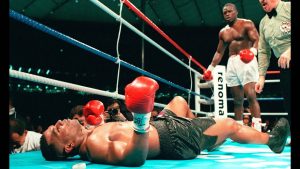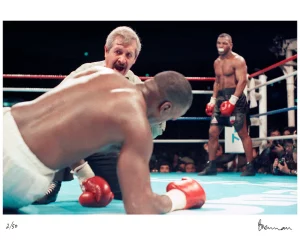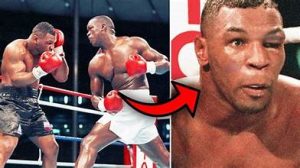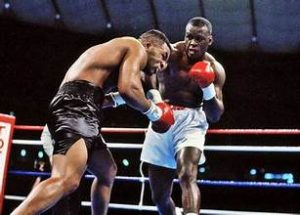Well, wasn’t THAT something?
Jake Paul, a 27-year-old social media YouTuber, actor, and fledgling professional boxer, vs. 58-year-old Mike Tyson, the former world heavyweight champion, in an eight-round bout that was essentially a pugilistic travesty.
Last Friday’s bout was like watching an exasperated grandfather chase his bratty grandson around the living room.
The highly hyped Netflix affair was dull, and after the first round, the outcome was predictable. There was no way Tyson would win this fight unless he landed a lucky right-hand punch flush on Paul’s suspect chin. By the second round, you could tell that Tyson’s legs were gone, and any boxer would tell you that strong legs are critical to landing powerful punches.

Tyson never got close enough to Paul to cause any harm. Tyson’s punches flailed harmlessly everywhere except Paul’s head and body. The result was a unanimous victory for Paul, whose record improved to 11-1, while Tyson’s fell to 50-7.
Paul walked away with $40 million, while Tyson earned $20 million. Not bad for 16 minutes of boxing over eight two-minute rounds.
Meanwhile, frustrated Netflix viewers dealt with streaming issues, including fuzzy and smeared pixels, dropped audio, and frozen pictures.
I have now watched Mike Tyson lose two fights—this sordid affair and another when he was in his prime as the world heavyweight champion.
Back in Feb. 1990, when I was the Chicago Tribune’s Tokyo Bureau Chief, I was at ringside covering the Mike Tyson-Buster Douglas heavyweight champion fight in Tokyo,
Unlike his fight with Jake Paul, the bout in 1990 was one that Tyson was supposed to win. Instead, it ended with one of the greatest upsets in boxing history.
Three weeks before the fight, Tyson arrived in Tokyo with a large entourage of hangers-on and at least one girlfriend. He was 23 years old, recently divorced from actress Robin Givens, and his record was 37-0 with 33 knockouts. Many boxing aficionados predicted Tyson was on a path to eclipsing undefeated heavyweight champion Rocky Marciano’s 49-0 record.

Tyson and his handlers were looking ahead to a bout with Evander Holyfield. It was to have been the long-awaited matchup of unbeaten heavyweights—a $35-million fight for which contracts already had been signed. It was to have been held June 18 in Atlantic City.
But first, Tyson had to take care of business in Tokyo and fight an unheralded longshot named Buster Douglas. Buster Douglas? Buster Douglas was easy money, a quick $6 million that Tyson’s ever-avaricious promoter, Don King, had wrung from Japanese boxing promoter Akihiko Honda. The Caesars Palace sports book carried Tyson as a 42-1 favorite.
Ho hum. Why not pick up a quick $6 million in Tokyo?
An overconfident and under-trained Tyson hit Tokyo nightclubs, attended parties, and sparred sparingly in preparation for this fight with Douglas.
The rest, as they say, is history. Here is the story I filed on the Tyson-Douglas fight 34 years ago. It certainly had more drama than last Friday’s Paul-Tyson contest.
Douglas KO’s Tyson in 10; Champion floored by a right hook
By Ronald E. Yates
TOKYO–Mike Tyson, a prohibitive favorite to retain his world heavyweight championship, was floored in the 10th round of his bout with James “Buster” Douglas Sunday in one of boxing history’s biggest upsets.
With a mild typhoon howling outside the Tokyo Dome and an unbelieving crowd of some 40,000 shrieking inside, Douglas peppered Tyson with a right uppercut, several left-right combinations, and a crushing right hook to send the former undefeated champion crashing to the canvas.
Tyson, his left eye swollen shut and his knees still weak, couldn’t climb to his feet in time to beat the count by referee Octavio Meyran Sanchez.

For a moment, those at ringside seemed stunned at what had happened, and Tyson himself seemed unable to grasp what had just happened. He looked across the ring at a jubilant, unmarked Douglas as Douglas hoisted his 11-year-old son Lamar in the air.
“You did it, Daddy, you did it,” the youngster said.
“I sure did,” Douglas said, breaking down in tears as he hugged his son.
“I did it for my mother,” Douglas said, wiping tears. Douglas’ mother, Lula Pearl Douglas, died in mid-January, just before Douglas was due to travel to Tokyo to train for his fight with Tyson. “I sure did it, didn’t I,” he said.
Indeed, he did. But earlier in the eighth round, it appeared it would be business as usual for Tyson when he caught Douglas with a crunching uppercut that sent the 6-foot-4-inch, 233-pound challenger crumbling to the canvas.

The fight might have ended there, but the knockdown came at the end of the round, and Douglas was able to stagger back to his corner, where his cornermen worked feverishly to revive him.
Tyson, who lacked the fire and intensity of previous fights, failed to press his advantage in the ninth round, which allowed Douglas to regain his strength and composure. As the ninth ended, Douglas peppered Tyson with left-right combinations- a harbinger of what was to come for Tyson in the fateful 10th.
Through most of the fight, Tyson had difficulty getting inside the awkward Douglas’ 12-inch reach advantage and resorted to lunging at the taller fighter. Douglas responded with left jabs to Tyson’s head, which kept the former champion at bay.
Though Tyson managed to walk from the ring, his cornermen carried him down the steps to his dressing room when he got under the Tokyo Dome’s stands.

“No comment, no comment,” Tyson’s entourage shouted at reporters who mobbed the former champion’s dressing room. “This room is off limits!”
Tyson also refused to conduct a post-fight interview with Home Box Office fight analyst Sugar Ray Leonard. HBO beamed the fight back to the United States.
Back in the middle of the ring, Douglas, who seemed dazed by his historic upset, waved to the crowd and shouted at the Japanese audience:
“Thank you for making my son, my trainers, and me feel so at home here in Japan. Thank you for making all of this possible.”
Even more dazed than Douglas was Evander Holyfield, the undefeated top-ranked challenger that Tyson was to have fought June 18 at Atlantic City.
“It was a great fight for Douglas,” said Holyfield. “He was the best man tonight. No doubt about it. But this didn’t look like the Mike Tyson I’ve watched before.”
“We rooted hard for Mike Tyson,” said Dan Duva, Holyfield’s promoter. “Now it’s back to the drawing boards.”
A Holyfield-Douglas matchup will not carry the luster nor the money of a fight with Tyson, admitted promoter Don King.
“My goal is to be world heavyweight champion, and I don’t care who I have to fight to reach it,” said Holyfield. “Douglas has the championship now, so he’s the one I want to fight.”
For their efforts Saturday night, Tyson reportedly earned $9 million and Douglas $1 million.
Douglas, 30-4-1, was too busy celebrating to think about his next opponent.
“Let me enjoy this one first,” he said when asked if Holyfield would be his next opponent.
Douglas seemed to take command of the fight from the opening bell and won the first three rounds as the frustrated Tyson tried unsuccessfully to reach his taller opponent.

By the fourth round, Tyson had battled back with punishing body shots that seemed to hurt Douglas. Both fighters appeared to tire in the sixth round with Tyson still unable to connect against Douglas.
Both fighters traded jabs and combinations in the seventh and eighth rounds until Tyson connected with a vicious uppercut that dropped Douglas at the end of the eighth.
With Tyson unable to put Douglas away in the ninth, the challenger peppered the champion with five straight punches that closed his left eye completely.
The fight was Tyson’s 10th title defense- the last six of which had ended in knockouts.
As Douglas sent Tyson crashing to the canvas, an American judge had the challenger ahead on points 88-82. One of the two Japanese judges had the fight scored 87-86 for Tyson, while the last judge had it 86-86.
“I don’t think Mike was hungry enough today,” said Holyfield.
The prospect of Tyson stepping into the ring against Douglas had electrified the Japanese about as much as a plate of yesterday’s sushi. That was reflected in the slow ticket sales for the 63,000-seat Tokyo Dome, a facility usually used for baseball by Japan’s champion Yomiuri Giants.
Ironically, some 2,000 ringside “Golden Seats” sold briskly at $1,035 each, snapped up by Japanese corporations as gifts to top customers and perks for executives, and by Japanese and foreign celebrities such as the Rolling Stones (in town for a series of concerts) and New York real estate tycoon Donald Trump, along with several Japanese pop singers, movie stars and television personalities.
However, a Tokyo Dome official confided that more than half the remaining 60,000 tickets were unsold before the fight.
It took King to keep the usually kinetic Japanese press, and public pumped up for the contest, a formidable task after reporters were invited to watch the 5-foot-11-inch Tyson walk through several listless practice bouts with taller sparring partners such as Greg Page and Phillip Brown.
The most excitement generated during the three-week run-up to the fight came when Page floored Tyson with a short right during a sparring session two weeks ago.
A lucky punch or a harbinger of what was about to happen?
–30—
If you enjoyed this post, please consider subscribing to ForeignCorrespondent and tell your friends to subscribe. IT’S FREE! WHAT A DEAL! If you’ve received this from a friend and would like to be added to our distribution list for future blog posts, please enter your email address in the sign-up in the notifications box at:
https://ronaldyatesbooks.com/category/foreign-correspondent.
You can also find my commentaries on Substack at https://ronyates.substack.com/ and the American Free News Network at https://afnn.us.
Please feel free to comment. WE LOVE COMMENTS!

